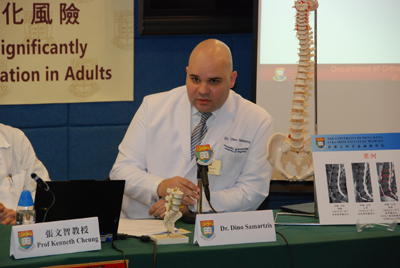HKU Finds Overweight and Obesity Significantly Increase the Risk of Spinal Disc Degeneration in Adults
26 Feb 2012
Low back pain affects every population worldwide, and is a leading cause of ill-health and sick leave in the working population of Hong Kong. One of the major causes of low back pain is degeneration of the joints of the spine, known as the intervertebral discs. A cohort study conducted by the Department of Orthopaedics & Traumatology at The University of Hong Kong Li Ka Shing Faculty of Medicine reveals that being obese in adulthood doubles the likelihood of having disc degeneration and developing more severe forms of the condition than those of normal weight. These findings are of public health concern and were published in the latest issue of the authoritative journal Arthritis and Rheumatism.
Traditionally, it is believed that disc degeneration occurs with aging; however, researchers at HKU found that being overweight and obese significantly contributes to the development of disc degeneration in adults, which is a novel finding. Disc degeneration is irreversible and may cause a lot of long-term suffering for patients, for instance serious low back pain, which may prohibit the patients to maintain a normal work and social life. Therefore, people with signs of being overweight or obese should lose weight, so as to avoid accelerating the process.
About the study
The findings of the study are based on the Hong Kong Degenerative Disc Disease Cohort, which currently consists of over 3,500 population–based Southern Chinese volunteers from the ages of 10 to 80 years of age. This is the largest programme of its kind in the world, and is supported by the University Grants Committee’s Area of Excellence award on “Developmental Genomics and Skeletal Research”.
The current study was a cross-sectional assessment of adults from this cohort who were 21 years of age and older. A total of 2,599 individuals were assessed with magnetic resonance imaging (MRI). Amongst them, 27% (n=709) did not have disc degeneration while 73% (n=1,890) had. Of the subjects who have disc degeneration, 7% were underweight, 48% were in the normal weight range, 36% were overweight, and 9% were obese. Overweight and obese individuals were also found to have a greater extent and severity of disc degeneration in comparison to those individuals of normal weight or underweight.
Implications and suggestions
The development of disc degeneration may potentially contribute to a greater severity of disc degeneration later in life and possibly a life-time of low back pain episodes. Low back pain may potentially affect daily function, diminish the quality of life, contribute to time off of work and lost wages, decrease productivity, increase health-care costs, and lead to psychological distress. As such, preventative measures should be considered to avoid disc degeneration that may have negative physical, socioeconomic, and health-care implications affecting individuals worldwide.
Overweight and obesity are pandemic conditions currently on the rise in Hong Kong. According to the Department of Health in 2010, overweight/obesity rates for adults aged 18-64 were 39.2%. The reported statistics justify a need to employ successful weight loss prevention and intervention strategies to control diseases related to overweight/obesity.
The Institute of Human Performance (IHP) of the University of Hong Kong has considerable experience in helping individuals to control weight. Overweight and obese individuals may be limited in the amount and intensity of activity participation they can tolerate. Therefore, initial participation into physical activity/exercise should include low-intensity physical activities, such as walking. When this level of activity is supplemented with simple dietary modifications, body mass changes and health benefits can be achieved. A fairly small decrease in weight (5-10%) can result in significant health benefits.
About the research team
This study was conducted by Dr Dino Samartzis, Professor Kenneth Cheung Man-chee, and Professor Keith Luk Dip-kei from the Department of Orthopaedics and Traumatology, The University of Hong Kong Li Ka Shing Faculty of Medicine in collaboration with Dr Danny Chan from the Department of Biochemistry, The University of Hong Kong Li Ka Shing Faculty of Medicine and Professor Jaro Karppinen from the Institute of Clinical Sciences at the University of Oulu, Oulu, Finland.
To use the press release photo(s) for any publishing, publicity and related purpose, photo courtesy should be given to “Li Ka Shing Faculty of Medicine, The University of Hong Kong”

(From left) Dr Robin Mellecker, Post Doctoral Fellow, Institute of Human Performance, The University of Hong Kong; Sean, overweight patient with disc degeneration; Professor Kenneth Cheung Man-chee, Clinical Professor, Department of Orthopaedics & Traumatology, The University of Hong Kong Li Ka Shing Faculty of Medicine and Dr Dino Samartzis, Research Assistant Professor, Department of Orthopaedics & Traumatology, The University of Hong Kong Li Ka Shing Faculty of Medicine

Professor Kenneth Cheung Man-chee says that since disc degeneration cannot be reversed, people should avoid being obese.

Dr Dino Samartzis points out that the majority of adults with disc degeneration experienced low back pain.

Dr Robin Mellecker states that to lose weight, overweight and obese individuals may start with low-intensity physical activities supplemented with simple dietary modifications.

(left) Professor Kenneth Cheung Man-chee and (right) Sean
